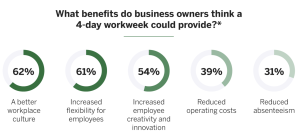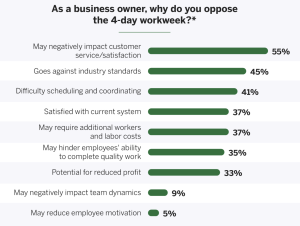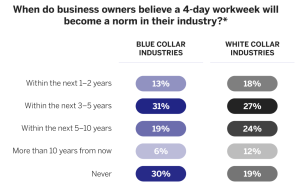Last week TLNT introduced you to affiliate marketing network, Awin – which has the distinction of being one of just a select few organizations that have decided to permanently transition to a four-day work week.
Rather than asking staff to work a compressed week – squeezing five days’ work into four – it’s set a 32 hour, four-day week, with staff still being paid their usual salary.
The company is – of course – still very much the exception to the working week rule.
However, our article – where we spoke directly to Awin’s HR business partner – has already prompted a strong (positive) response, and just one of the people who got in touch with us was Steven Rydin, CEO at B2BReviews.com.
Quite independently, Rydin and his colleagues have been busy conducting their own research , examining employer attitudes to having a four-day week.
And the results certainly surprised us.
It spoke to 504 business owners and 505 employees to gauge their opinions around a four-day work week.
Headline statistics from the research were that 62% of employers actually support the implementation of a four-day work week as a federal requirement no less.
In addition to this, more than half of employers said they would actually be willing to run their own pilot scheme to judge how transitioning to a shorter working week might work for themselves (see below):


This is certainly NOT the narrative we are used to – with previous data suggesting strong business group resistance to this fundamental change to the working week.
So does this survey suggest the tide might be turning?
We thought it would be a good idea to sit down with Steve to hear what he had to say.
(To read the full research, click here):
Q: You’ve stuck your neck out with this research, and got some interesting results. What was the impetus for doing it?
A: “We decided to look into this in more detail because we could see that some pilot programs testing out a 4-day workweek were quite successful in terms of increases in employee productivity, engagement, and revenue. While these programs focus on the employee experience, we wanted to gauge how employees and their employers felt about a possible change to a shorter work week.”
Q: It didn’t surprise us to see 80% of employees want a shorter week, but did the high employer support strike you as unusual?
A: “When you take into account the success of many 4-day work week pilots, then it’s not so shocking that nearly 60% of employers would also consider making the switch to a shorter workweek. While it may require some adjustment at first, the potential benefits of increased productivity, engagement, and revenue could outweigh the costs.”
Q: Difficulties providing cover, and meeting service level expectations were amongst the main reasons for opposing a 4 day week still. Are these justified, or do you think employers could tackle these problems by thinking a bit more outside of the box?
A: “The feasibility of implementing a 4-day workweek depends on the industry at hand. Industries like healthcare and hospitality, which require staffing throughout the week, may face challenges accommodating a shorter workweek. But, with proper organization and scheduling, it is possible to structure employee hours to reflect a 32-hour work week. Some approaches to consider may include staggering employees’ days off, hiring more part-time workers, or using overtime more strategically. On the other hand, businesses with entrenched practices and structures may encounter more resistance when attempting to adopt a four-day work week. Such organizations may need substantial restructuring to align with this new approach. I do also think that societal norms will need to adapt to this shift too. While a universal day off may not be the ultimate solution, exploring innovative and unconventional approaches could pave the way for improved work-life balance.”
Q: Do other reasons cited for opposing a four-day week make sense (ie reducing motivation/going against industry standards)?
A: “Implementing a 4-day workweek can pose challenges for industries with well-established systems that have been refined over the years. For example, intricate training and implementation processes in certain industries could be disrupted by a shorter workweek. This concern is understandable, and while solutions can be proposed, a transitional period may be necessary, potentially causing some employees to feel demoralized as they adjust to the changes. The idea that employees will have lower motivation on a 4-day workweek may come from the perception that a compressed time frame adds pressure to their lives. This can be detrimental for individuals who do not respond well to such pressure. There may also be concerns that reduced work hours could diminish employees’ investment or commitment to their work. However, these concerns highlight the need for a mental shift and a reevaluation of the balance between work and personal fulfillment. Achieving this balance is crucial for both individual wellbeing and overall productivity.”
Q: You find that 27% claim to offer a four-day week already. Really? This seems high
A: “More than a quarter of employers are now offering some form of a 4-day work week. This includes companies that may allow employees to take one or two Fridays off per month, as well as those that have implemented a permanent 4-day work week. The survey question was designed to capture and account for these diverse 4-day work week derivatives. These initiatives are indicative of the growing recognition of the 4-day work week as a viable and increasingly prevalent approach to work-life balance.”
Q: Although there’s strong support for a 4-day work week, do you think more high profile employers need to share their stories about it?
A: “As many people have reevaluated what work-life balance means to them over the past few years, there’s been a push to change the status quo when it comes to a traditional working environment. High-profile employers sharing their experience with a 4-day work week could be the inspiration other businesses need to try out some variation of a shorter week to gauge the potential success of making a permanent switch.”
Q: There’s big differences in support for a 4-day work week with it comes to which political side employers sit on. What’s your take on this?
A: “Traditionally, Republicans have been less supportive of the 4-day workweek. They typically believe that the government should play a limited role in regulating businesses and setting labor standards. However, not all Republicans are opposed to the 4-day workweek. Some Republicans believe that it could be a beneficial policy, but may argue that it should be implemented at the state or local level, rather than by the federal government. Some Republican respondents also expressed that this decision should ultimately be led by the employer. In contrast, Democrats have been generally more supportive of the 4-day workweek. They believe that the government has a responsibility to ensure that workers have fair wages and safe working conditions. As a result, Democrats are more likely to support policies like the 4-day workweek, which they believe would improve the lives of workers across the nation.”
Q: What do you think the likelihood of any laws actually being passed to mandate a 4-day work week?
A: “Although there haven’t been any laws passed yet, there’s been interest in the legislature, and even Congress, to try out a 4-day work week. Several US lawmakers in Maryland, New York, California, and Massachusetts have introduced bills to urge Congress to consider a 32-hour workweek.”
Q: How will four-day weeks start to be the norm if there are always pockets of resistance to it?
A: “Through more successful pilots, business owners sharing their experiences trialing a 4-day work week, and US lawmakers proposing bills to make a shorter workweek the norm, we hope that over the next several years, more employers will begin to implement a 4-day work week.”
Q: What do you think would convince more employers to ‘go for it’?
A: “It is essential to maintain ongoing discussions regarding work-life balance. In any situation, both organizations and individuals often struggle to initiate change without fully comprehending its value. Therefore, it is crucial to continue these conversations, fostering understanding and awareness of the significance of achieving a healthy equilibrium between work and personal life.”
What the research also found:



